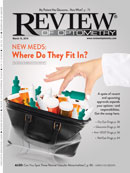Over the past five years in Jordan, ophthalmic anticholinergic preparations—which can be obtained from community pharmacies without a prescription—have been misused or abused in an attempt to experience mental altering effects, such as mood changes, euphoria or hallucinations.
Researchers recently analyzed the requests for ophthalmic drugs in community pharmacies in Amman, Jordan, and evaluated the most popular and frequently requested ophthalmic drops suspected of abuse, as well as the current methods that Jordanian community pharmacists use to manage such requests. They found that more education and enforcement efforts are necessary to raise awareness about drug abuse and encourage safe dispensing.
This prospective, cross-sectional, observational study was conducted at 16 different community pharmacies in Amman. A total of 140 ophthalmic product requests for 130 customers were analyzed.
The team found that dry eye was the most common complaint for which customers requested medication (23.1%) and that direct self-medication (i.e., requesting the product by name) was the most frequent method of purchase (48.5%). They noted that product requests were suspected for abuse purposes in 14.6% of cases and that the suspected cases were for pentolate (57.9%), prisoline (36.8%) and naphcon-A (5.3%). The researchers added that the majority of observed cases were for products requested without a prescription (84.2%) and that sale was refused in 12 of these cases (63.2%).
| Al-Khalaileh W, Abu-Farha R, Wazaify M, et al. Ophthalmic drug abuse: an observational study from community pharmacies. Res Social Adm Pharm. January 30, 2019. [Epub ahead of print]. |

